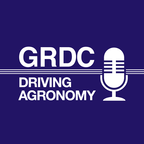
GRDC - Driving Agronomy Podcasts
Summary: Brought to you by the Grains Research and Development Corporation and presented by Online Business Radio’s Chris Brown, Driving Agronomy podcasts are released weekly and discuss various agronomic issues to assist and inform those in the Australian grain industry.
- Visit Website
- RSS
- Artist: Grains Research and Development Corporation
Podcasts:
The importance of summer weed control to conserve deep stored water has been quantified in a GRDC funded national project to improve water use efficiency by 10 percent. Scientists say the return on investment averages 353% - there is a return of $3.53 for every dollar spent on summer weed control. Two years into the project, we get a report on progress so far. Contact: James Hunt (02) 6246 5066, james.hunt@csiro.au
After drought across much of the west, harvest floods in the east and trouble abroad, what does 2011 hold in store for Australian grain growers? According to Ron Storey from Storey Marketing Services, we are either on the edge of a disaster – or not! What does he mean? Find out on GRDC Driving Agronomy.
GRDC has released a new guide which allows farmers to assess the risk of contracting the fungal disease, Blackleg, in their canola crops. Blackleg infection can cause up to 90 percent yield loss in canola and juncea-canola crops. The guide takes growers through a simple three step assessment process as described on Driving Agronomy by Steve Marcroft. Contact: Steve Marcroft (03) 5381 2294
Case Study: Climate Champions – Andrea and Mark Hanneman. The Hannemans realised their long term future depended on securing a long term supply of water for their farm. So they moved from 40 dams around their catchment to just one dam on top of their highest hill. Contact: Andrea Hanneman (08) 8628 4036
Anne Williams from Coonamble in NSW is the Northern Region winner of the Way We Were competition. On this program Anne talks about how far their cropping business has come since they bought their first farm just 18 years ago. Contact: Anne Williams (02) 6825 6212
Growers who have collected seed that has been wet at harvest are being urged to check the germination potential of the seed several times before sowing. While in Western Australia a new survey has revealed that a high percentage of sampled “cleaned” seed still had small levels of weed seeds much of which proved resistant to Group A and B chemicals. Contact: Dr Daryl Mares (08) 8303 7262 Meechelle Owen (08) 6488 1512
Windmill grass has joined the list of grasses showing resistance to glyphosate. What’s caused it on this edition of GRDC Driving Agronomy. Contact: Dr Chris Preston (08) 8303 7237
Craig Reynolds from Congupna in north eastern Victoria is the Southern Region winner of the Way We Were competition. On this program Craig describes his farm and how things have changed over the past 20 years. Contact: Craig Reynolds 0427 288211
Tony White from Miling in the central wheat belt of WA is the Western Region winner of the Way We Were competition. On this program Tony describes his farm and how things have changed over the past 20 years.
Every individual farmer should develop his or her own risk profile, according to farm business consultant, Darren Arney. Understanding price, production and cash-flow risk (as well as their personal tolerance to risk) allows farmers to plan their grain marketing strategy accordingly. Every farmer’s risk profile will be different depending on costs of production, production potential and other variable factors such as equity in the business. Contact: Darren Arney ph: (08) 8388 0684 Em: darrenarney@bigpond.com
It can cost up to $70,000 annually in variable and fixed costs to own a $500,000 header that is parked for 11 months of the year. So what issues should you consider before investing in farm machinery and what are some of the alternatives to outright ownership. On this edition of GRDC Driving Agronomy we look at some of the hidden costs of machinery ownership. Contact: Scott Boyle 0488 989 444
It’s not necessary to expand your land holdings to become more profitable. That’s according to John Francis from Holmes Sackett who says farmers can lift profitability by striving to become more efficient. Once efficiency targets have been achieved on existing country, it’s only then that farmers should consider buying or leasing more land. Contact: John Francis (02) 6931 7110 Email john@hs-a.com.au
A new study has cast doubt on the widely held belief that combine harvester fires are often caused by static electricity. Dr Graeme Quick says the key to preventing a fire is good sanitation – regularly checking the engine and exhaust areas for a buildup of plant material that could catch alight. Contact: Dr Graeme Quick (07) 5494 9920 Email: g.quick@bigpond.com
Having a mix of livestock and cropping can be an effective risk management tool. In a review of mixed farming, GRDC researchers have concluded that a 10 to 15 percent level of income from livestock helps to manage the inherent variability of income from cropping. There are also agronomic advantages and disadvantages which are analysed on this edition of GRDC Driving Agronomy. Contact: Dr Peter Tozer – 0418 163 102 Dr James Fisher – (08) 9641 1651
In a deregulated wheat market, the Wheat Classification Council plays an important role ensuring international and domestic market signals for wheat specifications are acted on by wheat breeders. On GRDC Driving Agronomy the Chair of the Wheat Classification Council explains how the wheat classification process works. Contact: Robert Sewell robert.sewell@wheatclassificationcouncil.com.au